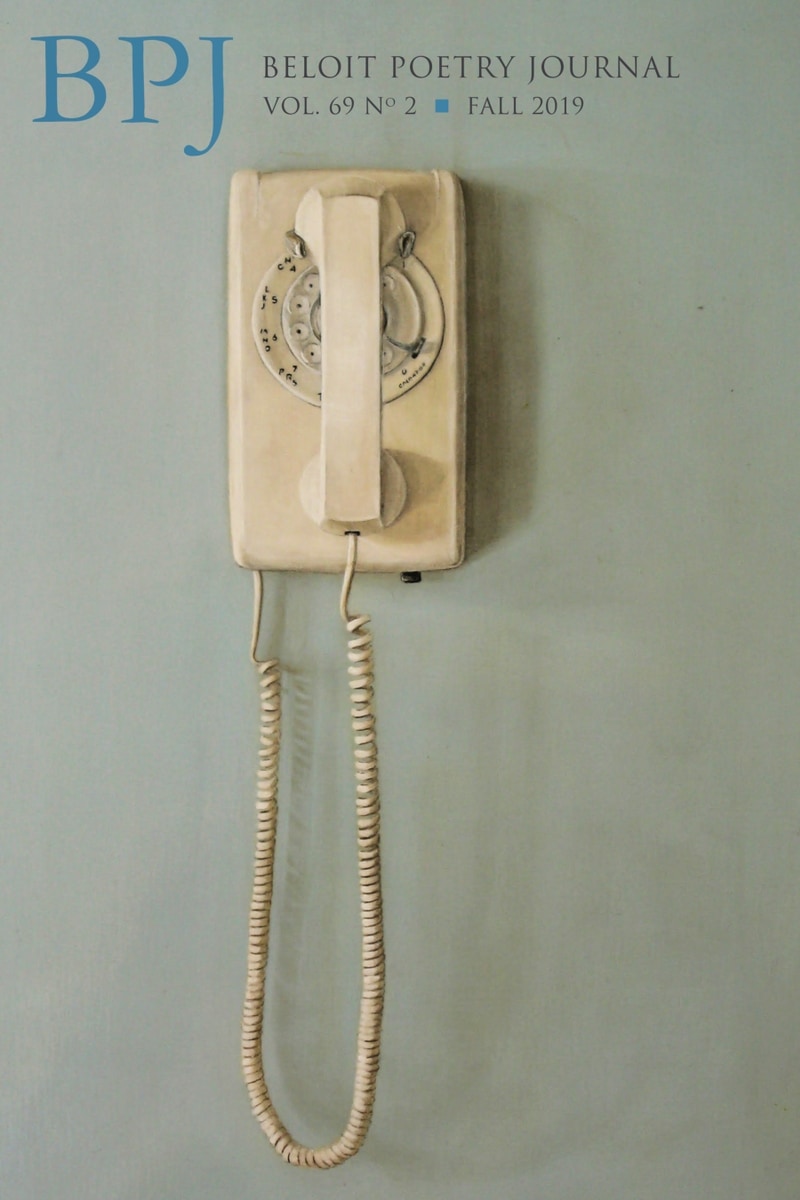Let’s say we begin and end with questions, and putting asidefor now those associated with being born: my fatherin his bed is a wrinkle among thin blankets. His breathan engine turning over. His arms go up sometimesin his ungentle sleep as if to protect the eggshell of his skull,as if he is hiding under the desk of the worldand the sirens have begun to blare. Dear Gravity,I cannot say he doesn’t float, despite this heaviness.He drifts in a half sleep, speaksin a half tongue; such dreaming only the dying can do.The meat he asks back to his bare boneswon’t come from soup or cups of puddingcajoled into the red gap of his open mouth, which has gone looseas a broken hinge. One one one more only, thisthe very last, the nurse says, spoon tilted, her own hips straightand solid, someone so planted in the worldit would take a violence to uproot her. My fatherboth sinks and soars in his dry, thin paper skin.His lips are red and dark and rough;despite such poverty of moisture, they demarkthe entrance to the watery cave of the body. The lexicon of questionsis poor in relation to that vast tunnel,the red and slightly pulsing tunnel beyond the ivory markersof his rotted porcelain teeth. Wherein that disintegrating labyrinthis the him that is? Not the lights that flashand blink on the body’s dashboard, notthe automatic systems that stutter alonguntil they don’t. Not even the voicethat sometimes booms out orderssurprising the muddle of confounded mutters,the litany of small refusals whispered hoarselyin the direction of the lamp’s plastic-wrapped shade.What is left, Gravity, after the body has been turned to ashesand after his imprint and stinkhave been replaced by someone else’s and after,even, the words have been spoken amongfriends and family and the catered panini cleared finally away,after the urn has been placed on a mantel,where will he be? Not anywhereanyone’s hand can reach for his own,which rests yet on the blanketand through which runs a live blue vein like a mountain range at duskseen from very far above.
Dear Gravity,
Feature Date
- June 12, 2020
Series
Selected By
Share This Poem
Print This Poem
Copyright © 2019 by Rebecca Aronson
All rights reserved.
Reproduced by Poetry Daily with permission

Rebecca Aronson is the author of Anchor, forthcoming from Orison Books 2021, Ghost Child of the Atalanta Bloom, winner of the 2016 Orison Books poetry prize and winner of the 2019 Margaret Randall Book Award from the Albuquerque Museum Foundation, and Creature, Creature, winner of the Main-Traveled Roads Poetry Prize (2007). She has been a recipient of a Prairie Schooner Strousse Award, the Loft’s Speakeasy Poetry Prize, and a Tennessee Williams Scholarship to Sewanee. She is co-founder and host of Bad Mouth, a series of words and music. Find her at https://www.rebeccaaronsonpoetry.com/

Fall 2019
Windham, Maine
Editor
Melissa Crowe
Associate Editor
Rachel Contreni Flynn
Managing Editor
Mark Crowe
Our longstanding mission is to seek out and share work of fresh and lasting power, poems that speak startling, complicated, necessary truths and that do so in surprising and beautiful ways. Since 1950, the BPJ has cleaved to a set of editorial practices that enable discovery of vibrant new voices and that foster long-lasting relationships with some of the most gifted, important poets of the twentieth and twenty-first centuries.
Our aim is to offer work that pushes boundaries of content, aesthetic, and form—to showcase what’s becoming of contemporary poetry—and we do so the old fashioned way. Senior staff read each submission thoroughly and openheartedly; when a poem moves, informs, and inspires us, we forward it to the entire editorial board, a group of about half a dozen skilled volunteer readers. These readers weigh in, and what continues to engage the group comes with us to the next biannual editorial board meeting.
…[W]e’re known for publishing long poems other journals won’t make space for. We’re known for publishing formally challenging poems, for printing the brutally honest and the unparaphrasable alongside the wryly funny, alongside lyrics that ring clear as bells. As a staff, we’re convinced there’s no other method by which the BPJ could remain so urgent, so eclectic, and so bold. Whatever other changes we embrace, we’re steadfastly committed to the editorial practice that has proven itself with issue after issue for nearly seven decades.
Poetry Daily Depends on You
With your support, we make reading the best contemporary poetry a treasured daily experience. Consider a contribution today.



